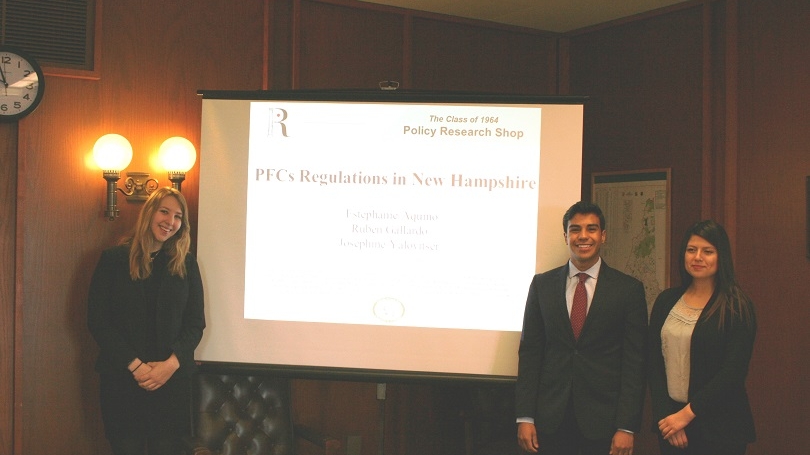
- Public Policy
- Leadership
- Funding
- News & Events
- About the Center
Back to Top Nav
Back to Top Nav
Back to Top Nav
Back to Top Nav
On Tuesday, April 3, 2018, Class of 1964 Policy Research Shop students Estephanie Aquino ’18, Ruben Gallardo ’18, and Josie Yalovitser ’18 travelled to Concord, NH to testify before the New Hampshire House Committee on Resources, Recreation, and Development.
They gave a presentation that summarized their report, “Drinking Water Standards in New Hampshire: Regulation of Perfluorinated Compounds,” (PRS Policy Brief 1718-05), which they had researched and written at the request of Committee Chair Chris Christensen.
Ruben, a government major with a minor in environmental science, and Josie, a psychology major with minor in anthropology, spent the fall and winter terms researching and drafting the report. Rachel Muir ’20 also worked on the report in the fall, and Estephanie, a government major with a minor in environmental science, joined the research team in the spring.
In their testimony, the students described the recent history of perfluorinated compound (PFC) contamination of drinking water in a number of New Hampshire towns, the basic properties and known potential adverse health effects of PFCs, their environmental impacts, and existing methods for correcting such contamination. They also discussed federal actions and guidelines regarding PFCs, and examined in detail other states’ responses to groundwater contamination by PFCs, including New York, Vermont, Texas, and Michigan. They evaluated actions taken to date by New Hampshire regarding regulation of PFCs, actions which are generally comparable with what the other states have done, and looked at what else might be done. Areas in which New Hampshire might consider additional action include: expanding the scope of the investigation task force in charge of monitoring PFCs in drinking water sources across the state, considering additional regulations of other PFCs besides PFOA and PFOS, and establishing surface water, ambient air, and soil standards while revising current groundwater standards regularly as more scientific evidence becomes available.